
















































































Mississippi’s rich cultural heritage is something to behold.
I can’t give you exact figures, but the number of writers, musicians, actors, artists and chefs that hail from our home state is grand by any measure.
Is it something in the air, water, or soil here?
I don’t know the answer, but the Mississippi roots of those in creative and artistic fields have spread far and wide in our country.
Let’s take American music for example.
The Mississippi Delta is widely known as the birthplace of the blues. B.B. King, Muddy Waters, and Robert Johnson are just three blues icons out of more than a dozen from Mississippi who birthed the blues as an art form.
Ike Turner, from Clarksdale, is credited with co-writing and recording the first rock and roll song, “Rocket 88,” in 1951 with his band, The Kings of Rhythm.
“The King of Rock and Roll,” Elvis Presley, was born in Tupelo, the hometown where he bought his first guitar and fell in love with gospel music in the community’s churches. Jimmie Rodgers, a native of Meridian and known for his distinctive yodeling, is widely considered “The Father of Country Music.” And that’s just American music!
Speaking of Meridian, we spent some time for this month’s issue at the Mississippi Arts + Entertainment Experience — The MAX for short — because it’s the only place in our state that celebrates all our creative and artistic superstars.
If you’ve never been, you will want to visit after reading our cover story.
Although The MAX is a clear salute to the legacies of the state’s best and brightest, their mission is solidly forward thinking.
Penny Kemp, The MAX’s president and CEO, told us through the facility’s interactive exhibits, workshops, and live performances, the goal is to engage young people in lifelong learning and creativity.
With The MAX, Meridian has solidified its reputation as one of the state’s most happening entertainment hubs. A destination for a day or weekend visit seems almost essential.
We hope you enjoy this issue.

by Michael Callahan
Executive Vice President/CEO









The Official Publication of the Electric Cooperatives of Mississippi
Vol. 78 No. 02
OFFICERS
Brian Hughey - President
Brian Long - First Vice President
Shawn Edmondson - Second Vice President
Brian Clark - Secretary/Treasurer
Michael Callahan - Executive Vice President/CEO
EDITORIAL STAFF
Lydia Walters - VP, Communications
Steven Ward - Editor
Chad Calcote - Creative Director
Kevin Wood - Graphic Designer
Alan Burnitt - Graphic Designer
Courtney Warren - Graphic Designer
Chris Alexander - Member Services Coordinator
Andy Tuccio - Media Solutions Director
Steve Temple - Social Media Director
EDITORIAL OFFICE & ADVERTISING
601-605-8600
Acceptance of advertising by Today in Mississippi does not imply endorsement of the advertised product or services by the publisher or Mississippi’s electric power associations. Product satisfaction and delivery responsibility lie solely with the advertiser.
• National advertising representative: American MainStreet Publications, 800-626-1181
Circulation of this issue: 466,795
Non-member subscription price: $9.50 per year.
Today in Mississippi (ISSN 1052-2433) is published 12 times a year by Electric Cooperatives of Mississippi Inc., P.O. Box 3300, Ridgeland, MS 39158-3300, or 665 Highland Colony Parkway, Ridgeland, MS 39157. Phone 601-605-8600. Periodical postage paid at Ridgeland, MS, and additional o ce. The publisher (and/or its agent) reserves the right to refuse or edit all advertising. The magazine is published for members of subscribing co-ops. The magazine is a bene t of membership.
POSTMASTER: Send all UAA to CFS. (See DMM 507.1.5.2) NON-POSTAL AND MILITARY FACILITIES: send address corrections to: Today in Mississippi, P.O. Box 3300, Ridgeland, MS 39158-3300 www.facebook.com/TodayinMississippi

www.todayinmississippi.com

Former President Jimmy Carter, who died Dec. 29 at the age of 100, was familiar with electric cooperatives from an early age.
He grew up on a 360-acre farm outside Plains, Georgia, that was electrified by the local co-op, Sumter EMC in nearby Americus, when he was a teenager. His father, Earl, helped organize it and later served as a board member.
Carter, even in his world-hopping post-presidential years, kept up with the co-op, which now serves more than 21,000 meters. Longtime CEO Ted McMillan, now retired, said back in 2015 that Carter would occasionally call him with a question about the electric service at a family property or to discuss a co-op policy.
During his improbable run for the White House in 1976, Carter spoke at an NRECA annual meeting in Anaheim, California. He recognized the association’s political clout and knew it could help deliver the rural votes he needed to get elected.
When his schedule precluded speaking at an NRECA gathering once in o ce, he welcomed General Manager Bob Partridge and a cameraman to the White House to shoot a video of him delivering a message that could be shown at the event.
In June 1978, he greeted the Electric Cooperative Youth Tour participants on the south lawn of the White House. After telling
them about the hardships of growing up on an unelectrified farm, he said this:
“I think the best day in my life, the one that I remember most vividly — with the possible exception of my wedding day — was the day they turned the lights on in our house. The bringing of the rural electric program to the farms of our nation made it possible for us to stretch our hearts and stretch our minds to encompass public involvement in a airs that would not have been possible without the rural electric program.”
The Carter farm is in the small community of Archer, about two and a half miles outside Plains. Earl and Lillian purchased the farm in 1927, the year Jimmy turned 3.
In 1937, Earl pitched in with Bishop William Dexter Johnson of the Archer A.M.E. church to sign up members to help get Sumter EMC o the ground. Johnson insisted that every residence, tenant-house, barn and even some chicken houses be wired.
Carter, in his 1975 campaign autobiography, “Why Not the Best,” remembered Johnson, who founded a vocational school for Black people, “as the most prestigious person in the community.”
NRECA
–








As the new year begins, I feel that familiar excitement of a fresh start filled with possibilities.
Whether I’m planning to expand my flower beds, start a vegetable patch, or experiment with new plants, January and February are the perfect times to lay the foundation for a successful gardening year.
It is also the time to reflect on what worked in my garden last season and what didn’t. Did my tomatoes thrive? Did my pollinator-friendly plants attract as much wildlife as I hoped? I like to jot down notes about my successes and challenges to guide my plans for the months ahead.




One of my favorite new year traditions is flipping through seed catalogs.
Many nurseries and online retailers release their o erings early in the year, giving me plenty of time to plan and order. I look for plants that suit my plant growing zone, and I always consider adding native species to support local wildlife.
For me, gardening is about more than just plants — it’s about connecting with nature, fostering creativity and finding peace in the process.
I set realistic goals for the new year. Maybe this is the year I’ll start a butterfly garden, try container gardening, or grow my first crop of heirloom vegetables. Having a clear vision makes my gardening endeavors even more rewarding.
This is also the time to stock up on gardening essentials like quality soil, fertilizers, tools, and mulch. Having everything ready makes planting much easier when the weather warms. Since I can’t wait to get started, the beginning of the year is a great time for me to sow seeds indoors. Crops like tomatoes, peppers, and herbs do well in trays on a sunny windowsill or under grow lights. Starting seeds indoors extends my growing season and ensures I’ll have healthy transplants ready to go when outdoor conditions are right.





On warm winter days, I head outside to clean up my garden. I remove spent plants, compost debris, and refresh my garden beds with organic matter.
Winter pruning is also on my list for shrubs and trees that need it, though I’m careful to check each plant’s specific needs before trimming.
I also take stock of my outdoor planters and beds.
If the weather allows, I might add cool-season plants like pansies, ornamental kale, or snapdragons. For my perennial plants, I focus on protecting them with mulch or row covers to help them weather the season.
Pollinator-friendly gardening is something I’m passionate about, and the new year is my chance to make my yard an even better haven for bees, butterflies, and hummingbirds.

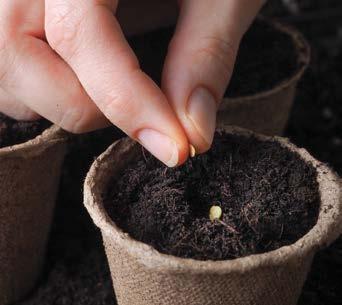


This year, I’ll add nectar-rich flowers like Turk’s Cap, Blue My Mind, or Wave petunias to my garden. I’ll also incorporate more native plants, provide water sources and avoid unnecessary pesticides to create a thriving ecosystem.
For me, gardening is about more than just plants — it’s about connecting with nature, fostering creativity, and finding peace in the process. As I plan my garden for the new year, I embrace opportunities for growth, not just in my garden, but in myself as well.
So, here’s to a year filled with vibrant blooms, bountiful harvests, and the joy that only gardening can bring.

by Dr. Eddie Smith
Southern Gardening columnist Dr. Eddie Smith, a gardening specialist and Pearl River County coordinator with the Mississippi State University Extension Service, is an internationally certified arborist, Produce Safety Alliance certified trainer, and one of the developers of the Mississippi Smart Landscapes program that encourages the use of native plants in the landscape.


















Mike Giles, a writer from Meridian and member of the Mississippi Outdoors Hall of Fame, hunted turkeys most of his life. His latest book, “Legends of the Spring, Masters of the Call,” contains stories of noted turkey hunters such as Ronnie “Cuz” Strickland with Mossy Oak in West Point and others telling how they hunted the special bird.
“In the book, I talk about one man who called up a turkey with a Pepsi-Cola bottle,” Giles said. “One of his friends collected bottles. One morning, this man worked a gobbler for three or four hours until he decided to leave. He found an old bottle and wanted to bring it to his friend. When he slapped the bottle to get dirt out, a turkey gobbled. He smacked the bottle again, and the man barely had time to put the bottle down and grab his gun before the turkey ran him over.”
Unless they get extremely lucky, novice sportsmen can’t just walk into the woods and bag a turkey. Hunting turkeys requires considerable preparation and knowledge of the magnificent birds.
“If someone wants to get into turkey hunting, I’d recommend they find a mentor who knows about turkey hunting,” Giles said. “If that’s not possible, people can listen to podcasts or watch numerous instructional videos on the internet. Some great hunters and callers make outstanding videos that teach people how to hunt turkeys.”
Every sportsman needs a good shotgun. Pattern the shotgun so it hits the target out to about 40 yards.
“Aim for the wattles, the little fleshy growths on a turkey’s neck,” Giles said. “That way, even if that turkey moves his head, the whole pattern will be on the bird. If someone aimed just at the head, a good portion of the pattern will miss.”
Next, people need good spring woodland camouflage from head to toe. With excellent eyesight, a turkey can instantly spot anything strange. They can also hear better than humans.





People can select from a variety of calls. Pick out one and learn the basics. Many companies post videos on the internet instructing people how to use their calls. Keep practicing.
“A box call is one of the easiest to master,” Giles said. “People can learn how to use a box call in a few minutes. A mouth call sounds good if someone knows how to use it properly.”
Next, hit the woods to find birds. Many Mississippi public hunting areas hold good turkey populations. Find where turkeys want to be and get close long before they wake up.
“The two biggest mistakes turkey hunters make are calling too much and a lack of patience,” Giles advises. “If people call too much, turkeys will know something is wrong. Some people call for 15 minutes. If they don’t see a gobbler, they leave. I’ve worked turkeys for hours before getting a shot at them.”






by John N. Felsher
John N. Felsher is a professional freelance writer, broadcaster, photographer, and editor who lives in Alabama. An avid sportsman, he’s written more than 3,300 articles for more than 170 different magazines on a wide variety of outdoors topics. Contact him at j.felsher@hotmail.com.
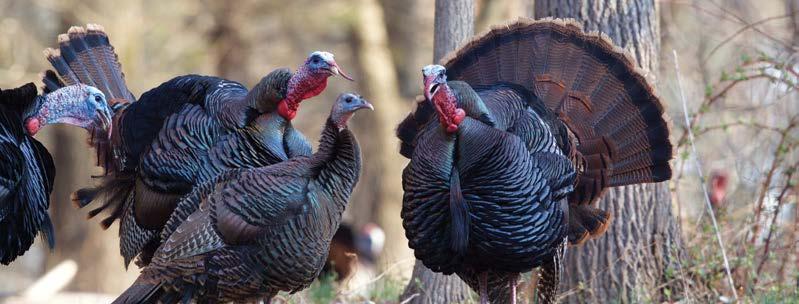






by Steven Ward


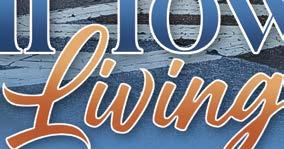


Mississippi author and photographer Erin Austen Abbott loves living in a small town.
That town, Water Valley, has a population of just over 3,300 people and is just outside of Oxford in north Mississippi.
Abbott and her family came to settle in Water Valley after living in cities such as Tampa Bay, Boston, Seattle, San Francisco, and Memphis.
“Living in cities, I’ve always felt the pull to be doing something. I don’t feel that in a small town. I can slow down and approach both my writing and photography, feeling calmer, and with more intention. With city living, I tended to feel like I was on a hamster wheel, bouncing from work to social events before starting it over the next day. I don’t feel that in a small town. I can go days without leaving my house and never once feel like I’m missing out on anything at all,” Abbott told Today in Mississippi.
Featuring a forward by Laurel’s Erin Napier of HGTV’s “Home Town” TV show, the book celebrates the joys of small town living with interviews and photos from towns all around the country.
I love sharing the stories of people who have made a living in a small-town part of their own story.
“I love sharing the stories of people who have made a living in a small-town part of their own story. And I love sharing the process of finding your small town, moving to a small town, and making a small-town work for you. It came to be because as I was thinking about what my next book would be, I kept getting messages from people all over the world, asking me how I found my small town, what it’s like to live in a small town,” Abbott said.
The book features a chapter on Clarksdale and interviews with Charles “Chuck” Rutledge and Ann Williams, owners of the Travelers Hotel, Collective Seed, and Red Panther Brewing Co.
Abbott’s love of small towns led to her penning her third book, “Small Town Living: A Coast-to-Coast Guide to People, Places, and Communities.”
Abbott, who was born in Oxford and lived there until she was 9, found her way back to Mississippi after comparing all her big city home experiences to her hometown.








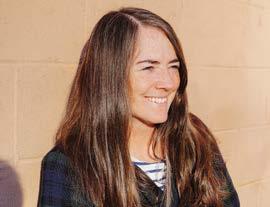

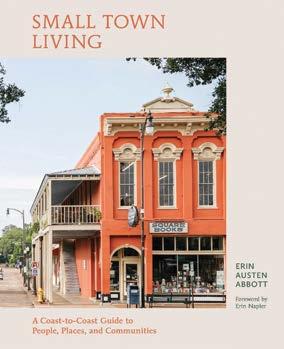
dawned on me that I could think about moving back to Oxford. In the 20 years since we’d left Mississippi, Oxford had risen in price and was out of my buying range. I’d been going down to a fantastic vintage store called Blue Heaven in Water Valley every few months from Memphis and had become quite fond of the town. Its proximity to Oxford made it an ideal location to think about moving and it reminded me of Oxford in the 80s when we left,” Abbott said.
When asked what constitutes a small town, population wasn’t the lone indicator, Abbott said.
“A small town, to me, is a place with a small central area, like a town square or a Main Street, a place where the community can be found eating lunch or shopping locally at one of the shops. It’s where you know your local grocer, neighbors, and even the letter carrier. You can pop into the hardware store, and they already know what project you are working on. I can remember when I first moved to Water Valley, the man at the paint store not only let me borrow his ladder to paint my ceilings, but he also dropped it o at my house for me to use. It felt like a real small-town moment.”





Abbott said she loves small towns because “we get to erase some of the noise.”
“I see friends with more intention and wake up early to write silently. I cook more and allow more time for myself, which I don’t think I gave much thought to when I lived in a city. I homeschool our son, which I think I’d only be able to do in a small town. I couldn’t a ord to homeschool if we lived in a city. However, this is just my experience, but the pace and community of a small town are where I feel most comfortable.”
For more information about Abbott and her book, follow her on Instagram @erinaustenabbott or visit erinaustenabbott.com







by Steven Ward
Just because you don’t have a title as a member of a club, that doesn’t mean you can’t display leadership.
That’s one of the many lessons Starkville Academy student Maggie Martin took away from her year-long experience with the Electric Cooperatives of Mississippi’s Cooperative Youth Leaders program.
Martin, a member of 4-County Electric, has been representing the state of Mississippi as the 2024 National Rural Electric Cooperative Association Youth Leadership Council (YLC) representative. She has been competing for the national YLC spokesperson against other electric cooperative youth leaders from around the country. The announcement of the winner was made right at press time.
Martin, 17, of Starkville, said she came to the leadership realization during the 4-County Electric interview and judging process for inclusion in the youth leadership program.


The Cooperative Youth Leaders program instills leadership skills, inspires creative thinking, encourages community service, and introduces students to elected o cials from their communities.
When a Starkville Academy counselor pulled Martin out of her AP chemistry class to talk is when Martin’s cooperative leaders adventure began.
“The counselor told me I would be a good fit for the program. I felt like, ‘are you sure?’ I didn’t really feel qualified,” Martin said.
You need to be your authentic self. Don’t try to be what you think others are looking for. You want to be authentic so you can discover your talents and let others step in where you might be lacking.
“I had a hard time at first, but I realized as I was answering the question that leadership was redefined for me and not dependent on a title,” Martin said in an interview with Today in Mississippi.
Martin started out as one of 85 high school juniors from around the state who were chosen to participate in ECM’s Cooperative Leaders Workshop in Jackson in February of last year. Martin was one of 10 students from that group to interview for a chance to represent the state nationally.
Following a 10-minue interview with judges, the captain of the Starkville Academy junior varsity and high school cheerleading squads was chosen as one of the students to represent 4-County at the workshop.
Cheerleading was not the only extracurricular activity Martin was involved with.
Martin participated in several service organizations on campus including one that is closest to her heart, Better Together.
Better Together is a club dedicated to serve, help, and encourage students in school and in the community.
“The idea being that, when serving the community, two are better than one,” Martin said.
During the workshop in Jackson, Martin said she made tons of friends and learned even more during the leadership activities the 85 students participated in at the event.
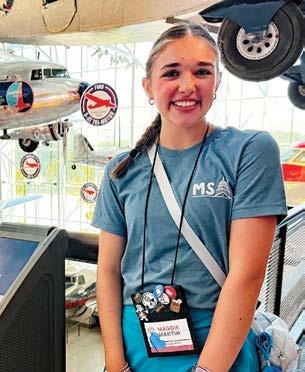

One of her favorite parts of the workshop was meeting state lawmakers that represented her from the Starkville area.
“I especially enjoyed the talk from (Mississippi) Secretary of State Michael Watson. He turned the tables on us at the end, and we had a Q/A where he asked us what kinds of change we wanted to see. That showed me that we can have an impact, even as teens,” she said.
On the last night of workshop, Martin was one of 10 students chosen to interview with judges to compete for the statewide YLC spot.
Martin had 10 minutes to write a two-minute speech to give to the judges.
“It was very challenging. It was a short amount of time, but one of the subjects we could write about was, what form of art is the most meaningful to you,” Martin said.
An avid reader — as well as a dancer and piano player — Martin chose to write a speech on her love of reading.
Martin said she was shocked and then a little teary eyed when her name was called the next day as the statewide YLC winner.


Martin later went with the other workshop students on an all-expenses paid trip to Washington, D.C. last June.
Martin also gave a speech at the ECM Annual Meeting in Biloxi this past September and filmed another speech for judges to view when they choose the national YLC representative.
Martin said she plans to attend Auburn University after she graduates to pursue a degree in biomedical sciences and then go to medical school. Although things could change, Martin said she wants to pursue a career as an oncologist.
When asked what advice she would give to other students interested in the ECM program or leadership in general, she said students need to be themselves.
“You need to be your authentic self. Don’t try to be what you think others are looking for. You want to be authentic, so you can discover your talents and let others step in where you might be lacking,” Martin said.
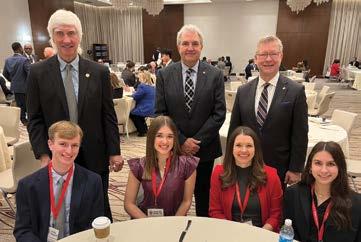



















$100,000 Adult Life Insurance
• Rate schedule is based on your current age and is guaranteed for the life of the policy.
• Monthly rates as low as $3.49.
• Coverage is also available for your spouse and other family members.
• Benefits will NEVER be canceled or reduced for the life of the policy if premiums are paid on time.
Policy Form #SRTCV/SRTCV R13 or R17, or #SRTCV90MA in MA CA Residents, for your consumer rights, please visit beginglobeinsurancetoday.com/privacy.













$30,000 Children’s Life Insurance
• Rates are based on your children’s or grandchildren’s present age and never increase for any reason.
• Monthly rates as low as $2.17.
• Benefits will NEVER be reduced or canceled if premiums are paid on time.
• Give your children a financial head start right now. Your policy builds CASH VALUE for your family’s needs.
Policy Form #GWL2001 or GWLA001
(Offer may vary, $100,000 coverage not available in all states.) CHOOSE $5,000, $10,000, $20,000, $30,000 OR UP TO $100,000 COVERAGE





by Abby Berry
Ensuring your home is properly insulated can improve energy efficiency and make your home more comfortable. Insulation acts like a cozy coat that reduces heat loss during winter months and a protective layer that reduces heat gain during summer months.

Many older homes have less insulation than newer homes, but even newer homes can benefit from additional insulation. While it’s not the least expensive efficiency improvement, adding insulation and air sealing your home can provide the biggest bang for your buck in energy savings and overall comfort.
The most common areas to insulate are attics, ceilings, crawlspaces or unconditioned basements, exterior and interior walls, floors, and ductwork located in unconditioned spaces.
The amount and effectiveness rating of insulation required for each area varies by climate, but many websites like The Department of Energy or Home Depot provide easy-to-follow recommendations. Visit energy.gov/insulation to learn about recommended R-values for specific areas of the home based on climate zones.


It’s important to understand how insulation effectiveness is measured. Insulation is rated in R-value, which measures the material’s resistance to conductive heat flow. The higher the R-value, the greater the insulating effectiveness. The R-value you’ll need depends on factors like climate, type of heating and cooling system, and which area of the home you plan to insulate.
Insulation is offered in a wide range of materials from bulky fiberglass rolls to cellulose materials made from recycled paper products. If you’re considering installing additional insulation, talk to an expert who can offer guidance on the right materials for your budget, climate, and comfort needs.
Investing in proper insulation for your home not only enhances comfort but also reduces energy consumption.
Abby Berry writes on consumer and cooperative affairs for the National Rural Electric Cooperative Association.
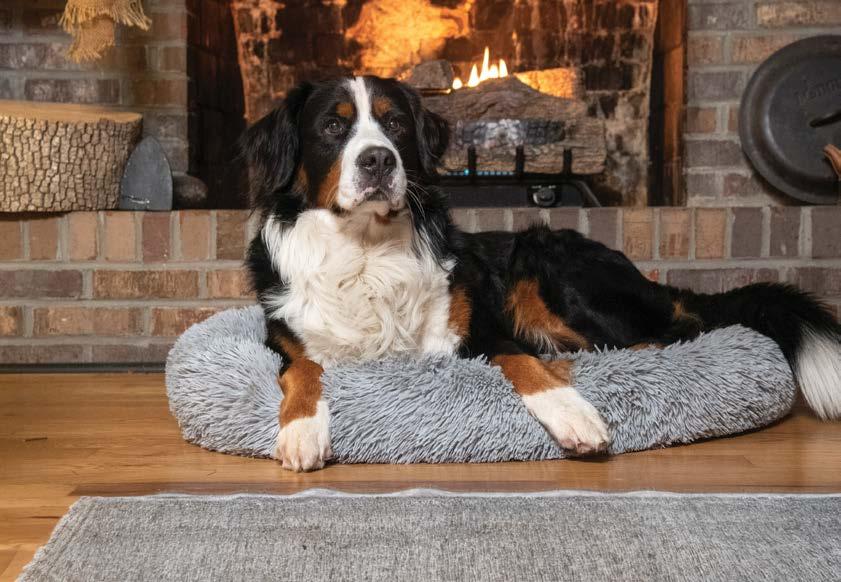



QI heard fireplaces can make your home colder. How do I keep my home comfortable while enjoying cozy fires?
by Miranda Boutelle
A heat pump heated our home. We had an open fireplace that was more suited for ambiance than creating heat. When you have a fire, warm air rises and draws the smoke out through the chimney. This also draws the warm air out of the house. This invisible force is called the stack effect.
The impact is exacerbated in drafty homes. When the warm air escapes through the chimney, it is replaced by cool air leaking in through gaps and cracks in the home. The greater the difference between the indoor and outdoor temperatures, the greater the stack effect, hence dad’s rule of no fires on the coldest nights.
Wood fireplaces are not an efficient option to heat your home. Most of the heat goes out of the chimney. If you enjoy the comforting ambiance and curling up in front of the fireplace during the colder months, here are some tips to efficiently operate a fireplace in your home.
AWhen I was a little girl, I remember my dad telling me that some nights were too cold to have a fire. That always seemed crazy to me, but like many other things he said, he was right.
Because it is out of sight, it can be easy to forget to close the chimney damper. The damper should be open when you have a fire going or when any hot ashes are in the fireplace to ensure smoke and carbon monoxide don’t come into your home. Once the fire and all ashes are fully extinguished, close the damper. Leaving the damper open allows warm air to escape, wasting energy. It’s like leaving a window open when your heating system is turned on in the winter.
If your damper doesn’t close properly or your chimney doesn’t have one, purchase a product designed for the task. There are a variety of chimney plug sizes and styles available, including inflatable options designed to fit snugly in place. While you are at the hardware store, pick up some caulking and weatherstripping to seal air leaks around windows, doors, and pipes along exterior walls.
Fireplaces with gas logs are required to be installed with a mechanism that always keeps the damper open. This safety feature allows gases from the pilot light to escape. Glass doors can reduce the impact of air leakage in the winter and summer months. Consider installing glass doors on open fireplaces and keep them closed to minimize drafts.
Sealed combustion gas fireplaces are fully enclosed systems that draw the air needed for combustion from the outside. When properly installed, you get the benefit of the warmth of the fire without the worry of heat loss from drafts. If you have gas logs and enjoy the ease of a gas fireplace, consider upgrading to a sealed combustion unit.
Turning the pilot light off in the summer can reduce wasted gas. If you plan to turn the pilot light off, follow the instructions in the owner’s manual to avoid any potential safety issues.

Fireplaces
with gas
logs are required to be installed with a mechanism that always keeps the damper open. This safety feature allows gases from the pilot light to escape.


Woodstoves and pellet stoves are additional options that provide more heat than wood or gas fireplaces. Federal tax credits are available for high-efficiency biomass stoves. A credit of 30% of the project cost — including the cost of installation up to a maximum of $2,000 — is available for products purchased and installed between Jan. 1, 2023, and Dec. 31, 2032. The unit must have a thermal efficiency rating of 75% or more.
If you have a woodstove, fireplace, or any fuel-burning appliance in your home, be sure to install and maintain smoke and carbon monoxide detectors. Carbon monoxide is an odorless, colorless gas that can be harmful or even deadly if not detected.
Use my dad’s sage advice and these tips to keep your home warm while gathering your loved ones around a glowing fire during the winter season.
Miranda Boutelle is the chief operating officer at Efficiency Services Group in Oregon, a cooperatively owned energy efficiency company.

February brings some of the coldest weather of the year, and as our home heating systems work harder and longer to keep us warm, we typically see higher energy bills.
There are a few key factors that affect electricity prices, as well as a few ways you can make a meaningful impact on home energy savings. When you receive your monthly bill from your co-op, you’re provided with a summary of how much electricity you used during the billing cycle. You can even see how electricity use may have spiked on days when you used more electricity, such as a particularly chilly day or when relatives were staying with you.
But you might be surprised to learn that beyond your monthly energy consumption, there are external factors that can impact the cost of electricity.
Your co-op purchases electricity from a power generation partner at a wholesale cost, then we deliver that power to our local communities. The cost of generating and transmitting electricity from our generation partner accounts for a significant portion of the cost to provide electric service to local homes and businesses — and the cost of fuels that are used to generate that electricity, such as natural gas and coal, fluctuate based on supply and demand. While these fluctuations can impact the cost of electricity, we work closely with our power generation partner to plan ahead and help stabilize electricity prices for our members.
While we can’t control the weather, we can review weather patterns and forecasts to prepare for times of extreme cold or heat, when we know the demand for electricity will increase. But when temperatures become extremely cold and the demand for electricity spikes, the price of electricity can also increase.
To cover the costs associated with providing electricity to your home or business, Co-op members pay a monthly charge. This flat monthly fee ensures the cost of equipment, materials, labor, and daily operations are covered for all members in the service territory. To ensure the reliable service you expect and deserve, we must maintain the local grid, including power lines, substations, and other essential equipment.
Federal energy policies and regulations can have a profound impact on electricity costs. As energy generation shifts to the use of more renewable sources and stricter regulations for traditional, alwaysavailable fuel sources, such as natural gas and coal plants, costly upgrades, and technologies must be constructed and deployed. These additional costs are ultimately passed to consumers.
U.S. power consumption is expected to double by 2050. Across the country, electric cooperatives are working with members of Congress to advocate for smart energy policies that reliably power our local communities.
While many of these external factors that impact electricity costs are out of our control, we all have the power to manage our energy use at home. The most effective way to lower use is thermostat management. Since heating and cooling account for a major portion of home energy use, adjusting the thermostat to the lowest comfortable setting can help you save energy and money. Remember to service your heating and cooling system annually and replace dirty filters as needed.
You can also reduce energy use by taking advantage of off-peak periods, when the demand for electricity is lower. Reserve energyintensive chores for off-peak times, such as early in the morning or later in the evening, to save energy. Be sure to seal air leaks around windows, doors, and other areas where gaps are possible. This will help your heating and cooling system work less and improve the overall comfort of your home.
Your co-op is your local energy partner, and we’re here to help. As always, we will continue working diligently to provide you with reliable power at an affordable cost.
If you're tired of having knee pain and want to talk to a doctor that can virtually give you your life back if knee pain is an issue, call Dr. Rob Acord... as he's the only doctor in the area... who has this newly discovered knee pain reduction technology.
If you have knee pain, can't walk because of an old injury, or you just think it's part of getting old, you might want to read this article.
Knee pain is something that disables a lot of people every single year, but most people don't know what to do about it.
Some people immediately opt in for surgery, then some people watch TV and end up buying something they wrap their knee with-hoping it will help, and others just follow orders and take medications which simply block the pain signals while the underlying condition often progresses.
All I'm saying is this. There are a lot of ways to TREAT your knee pain, but which one will really work?
If you've done your research, you know that there are not a lot of things that really work when it comes to actually helping align the knee, taking nerve pressure off the knee, and reducing the pain and swelling.
What if there was a "real solution" that worked from DAY ONE?
Hi, I'm Dr. Rob Acord and I'm here to tell you about a new device called the K.P.R.
I stumbled onto this one-of-a-kind machine at a recent medical conference and tried it myself. THE RESULTS: My knees have never felt so good, and that was after.... just one treatment.
It virtually reduced my knee stiffness by 95%, so I am positive it'll help your knee pain, help you walk better as soon as you get your first treatment, plus help you do some things you used to do without the help of a walker, cane, or someone else helping you

Now, don't get me wrong. I'm not guaranteeing a miracle if you haven't walked in many years.... but this just may be the answer you've been looking for.
Better late than never for sure. You should entertain this option... no matter what's happened to you in the past!
Let me be very clear; I'm here to possibly help you:
Get out of pain
Walk better
Move better
Get up and down better
Get out of chairs easier
AND...
Finally you will be able to move without relying on someone or something else
"What if my knee(s) are BONE ON BONE?"
Here's all I can tell you If you’re bone on bone, and surgery is not an option for you, or surgery didn’t work, this may be the exact treatment you’ve been needing
You'll find out that K P R is an amazing machine when teamed up with our Class IV laser therapy
Great questions and here's the answer: We have a reputation for getting great results, but if you're like most of our patients you know that the knee problem isn't going to just go away on its own. We're also known for our personalized care We don't promise the world, but we will do everything humanly possible to get the results you want.
"I've NEVER done this before!" I'm going to offer you a consultation, knee examination, X-Rays, and TRIAL VISIT for only
$47 $47
We'll know almost IMMEDIATELY if we can help and most importantly, YOU WILL TOO
As you know, it's human nature to procrastinate; this is not the time to do that... WHY?
My Trial Offer goes away at the end of this month It's available as a hard deadline because I have a limited number of trial spots and we are already an extremely busy office. Pick up the phone and call the office now This one call could change the way you walk, feel, and move CALL TODAY!
Dr. Rob Acord, D.C.



















by Steven Ward
“I had no idea.”
That’s one of the most common reactions from first-time visitors to the Mississippi Arts + Entertainment Experience in Meridian, according to Penny Kemp, the facility’s president and CEO.
“The two most common refrains we hear from visitors are ‘I am blown away’ and ‘I had no idea,’ which often means I had no idea just how many significant artists Mississippi has produced, coupled with I had no idea what all was here,” Kemp said.
There’s just something about Mississippi. The number of writers, musicians, actors, chefs, and artists from the state is staggering.
Elvis Presley, William Faulkner, Morgan Freeman, Jimmie Rodgers, Tammy Wynette, Jim Henson, Oprah Winfrey, B.B. King, Robert Johnson, and William Eggleston are just a tiny fraction of legends from the state, and the Mississippi Arts + Entertainment Experience — also known as The MAX for short — is dedicated to the stories of them all.
“It’s the best kept secret in Mississippi, and I aim to destroy that idea,” Kemp, who took over the facility a year ago, said laughing.
The MAX dates back to 1999 and originated with the state commissioner of Agriculture. What started as an idea to create a country music museum expanded to develop a center devoted to southern arts and culture with legislation dating back to 2001.
The stated mission was to entertain and educate through exhibits, interactive learning experiences, concerts, readings, demonstrations, classes, and other activities.
The two most common refrains we hear from visitors are ‘I am blown away’ and ‘I had no idea,’ which often means I had no idea just how many significant artists Mississippi has produced, coupled with I had no idea what all was here.
An arts and cultural center in the heart of downtown Meridian, The MAX opened its doors in April 2018 and celebrates Mississippi’s arts and entertainment legacy while nurturing future creatives through innovative interactive exhibits, workshops, and live performances.
The MAX was built and is funded via a local food and beverage tax, state and local government contributions, foundation grants, private giving, and earned revenue from admissions, store sales, memberships, and event rentals.
The physical centerpiece of The MAX is the two-story Hall of Fame rotunda featuring Mississippi arts and entertainment legends. The Hall of Fame counts 38 members so far, five of whom were just inducted this past January, including author and photographer William “Bill” Ferris, Civil War historian and novelist Shelby Foote, singer Bobbie Gentry, guitarist and songwriter Mac McAnally, and poet Natasha Trethewey.

“Lining the rotunda are huge, oversized images of America’s creative giants of music, literature, theater, and visual arts — all with deep roots in Mississippi. B.B. King, Elvis Presley, William Faulkner, Oprah Winfrey, Eudora Welty, Walter Anderson, Jim Henson, Leontyn Price, and Morgan Freeman are just a few examples. Interactive kiosks display information about each of the artists’ connections to Mississippi, their achievements, and what shaped their craft,” Kemp said.
Upstairs, there’s 20,000-square-feet of interactive exhibits. In a roughly seven-minute introductory video, Marty Stuart, Mac McAnally, Dorothy Moore, Maude Schuyler Clay, and William Dunlap attempt to explain why Mississippi produces such a disproportionate amount of creative talent.
Visitors have an opportunity to explore different galleries and artifacts, including one of B.B. King’s original “Lucille” guitars, chef and restauranteur Robert St. John’s childhood Easy Bake Oven, and the jacket actress Sela Ward wore on her hit TV program, “Sisters,” right next to the Emmy award she won for her performance on the show.
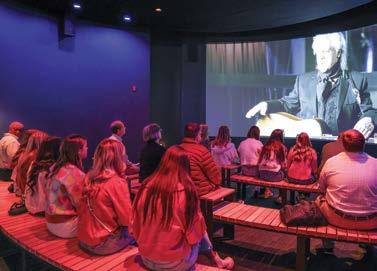

“From the juke joint where you can assemble your own virtual band of Mississippi artists, to the church featuring an exquisite stained glass window by Pearl River Glass Studio and the sounds of the Mississippi Mass Choir, each gallery tells a little more about Mississippi’s creative legacy and the inspiration behind some 200 artists featured within The MAX. Each gallery points to why and how so many famous Mississippians were drawn to create, the roles of home, land, church, and community in their craft, and the global influence Mississippi has had on arts and culture,” Kemp said.
The sheer size and scale of The MAX is unique, but so is the interactive experiences offered.
“The MAX is a place to experience and participate in arts and culture. Pottery demos, art classes, culinary tastings, live music performances, songwriting workshops, documentary screenings, book readings, audio-engineering courses in a live recording studio, and make-and-take workshops occur at various times throughout the year,” Kemp said.
Although tourists are drawn to The MAX, Kemp said, the main goal of the facility is to engage young people in lifelong learning and creativity.



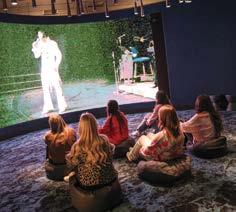






“Over 80 school field trips came through this past year, reaching some 4,000 students, and we’re working with the Mississippi Arts Commission on future endeavors to train more teaching artists to use arts in the classroom for curriculum-based learning,” she said.
“And something wonderful happens when young people visit. They actually put their cell phones down to participate. It’s something to see,” Kemp said.
It’s funny to hear people’s reactions. Residents leave with a renewed sense of pride in our state; while visitors from outside Mississippi are taken aback by the sheer volume of notable artists and the global impact Mississippi has had on arts and culture, changing their impressions of Mississippi.
Kemp said a crowd favorite is the “boat room.” Sitting in a small boat skiff positioned in front of a floor-to-ceiling curved video wall projecting images of Mississippi landscapes, it feels as if you’re literally floating down the Mississippi or across the Gulf to Horn Island, much like Walter Anderson did. Visitors are mesmerized as realistic landscape photography morphs into paintings by Walter Anderson, William Hollingsworth, and Marie Hull, while a voiceover explains the role of the land in shaping the artist’s craft.
From Feb. 22 to May 24, The MAX will host “Thank You Please Come Again: How Gas Stations Feed and Fuel the American South,” a photography exhibition by Jackson native Kate Medley. The exhibition offers audiences an opportunity to experience photographs from Medley’s award-winning book by the same title. Featured in The New York Times, The Washington Post, and

CNN, among others, “Thank You Please Come Again” was named a Best Book of 2024 by National Public Radio, won the 2024 Mississippi Institute of Arts & Letters prize in photography, and was a finalist for a James Beard Award. The MAX will host an artist-in-residence, bringing Medley in for a week of workshops. Medley will be able to create new work and guide and mentor area students, exposing them to career opportunities in photo journalism and the study of cultures and folklore.
On April 12, The MAX will host the fifth annual Sipp & Savor, a food and drink festival celebrating the best of Mississippi and the south’s cuisine. Close to 50 chefs, master mixologists, and distillers will present samples and tastings for visitors.
Chef Vishwesh Bhatt of John Currence’s city Grocery Restaurant Group will headline the festival. Visit sippandsavor.com for more details.
Kemp said Mississippians can’t visit The MAX without learning something new about their state’s history.
“It’s funny to hear people’s reactions. Residents leave with a renewed sense of pride in our state; while visitors from outside Mississippi are taken aback by the sheer volume of notable artists and the global impact Mississippi has had on arts and culture, changing their impressions of Mississippi.”





















































All young boys playing baseball in the backyard with their buddies dream of playing major league baseball. The odds against those young lads making it to the majors are staggering. Less than 1% of high school baseball players are drafted by one of the 30 major league teams. Those teams can have only 26 players at any time, and only 5% play college baseball.
Ben Ingram, one of the rare exceptions, made it to the majors, but on a di erent path. He quite literally talked his way into the game. The odds of him talking his way to the majors are so impossible that it would probably be less than 0.%. The Madison Central High School graduate defied those odds as he is one of only 30 lead broadcast announcers in the entire major league. This season he will begin his
fourth year as the Atlanta Braves’ lead radio announcer and 15th year with the organization.
The journey for Ingram began in high school when local sportscaster Lee Adams gave him his first opportunity to do both high school and Hinds Community College football broadcasts. “Lee taught me all the basics, and I owe him so, so much,” said Ingram, a Mississippi College graduate.
Those early experiences with Adams sold Ingram on a career in sports announcing. He decided to attend Mississippi College after a weekend visit to the school in his senior year of high school. “I was not even considering MC, but I visited anyway. I knew after that weekend that MC would a ord me more opportunities.”


“Mississippi College was such a great experience. It gave me a hands-on experience that I would have probably never experienced anywhere else. The entire communication faculty gave me so much support. Dr. Billy Lytal saw something in me and gave me the opportunity to do play-by-play for the Choctaws,” said the son of a preacher. Ingram did play-by-play football, basketball, and baseball on the campus radio station. Those college days led to play-by-play baseball stops with the Jackson Senators and the San Diego Padres Single A team in Eugene, Oregon. “The Eugene team called me for a job interview after I visited with several organizations at the Major League Baseball Winter Meeting Job Fair in Los Angeles. I told the people in Eugene in a phone interview the next week, ‘I am your guy.’ About 30 minutes later they called me back with a job o er.”

Being named Broadcaster of the Year was the break I needed. That same year more doors seemed to open after I attended a game in Atlanta. That game was a blessing for me because it rained.


That one year in the northwest led him back home. He served as color commentator for the Mississippi Braves in 2007 before taking over the play-by-play duties in 2008. In only his second year, he was named the Southern League Radio Broadcaster of the Year. “Being named Broadcaster of the Year was the break I needed. That same year more doors seemed to open after I attended a game in Atlanta. That game was a blessing for me because it rained. The game had at least a two- to three-hour weather delay. It gave me an opportunity to meet the Braves’ announcers Joe Simpson and Don Sutton. I was able to have a nice long conversation with them during the halt in play. Sutton found out I attended Mississippi College just as he did, and after that he took me under his wings. In January 2011, I received a call to come for an interview, and that led to my first job in the majors.”
The Mississippi boy hosted the Braves’ pregame show from 2012 to 2020 and the postgame show from 2011 to 2019. He became the lead radio announcer in 2021. In his first year Ingram did something that many veteran play-by-play guys never do in their entire career: he called the final out of the World Series. “Is this happening? The Atlanta Braves are the 2021 World Series champions in six games over the Houston Astros. In the eighth inning, I started thinking about what I was going to say. I wanted to be factual because this was a historic moment in Braves baseball,” said Ingram. “I am doing what I have wanted to do since I was a kid,” said Ingram.
Some kids’ dreams do come true.



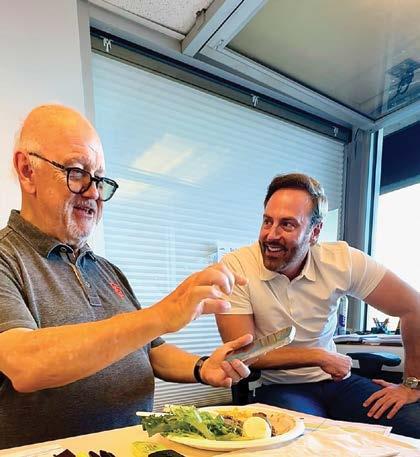



by Dale McKee
Dale McKee is a Waynesboro
who has been writing about sports in Mississippi since 1973. He is a member of Dixie Electric. Contact him at ddmckee18@yahoo.com.
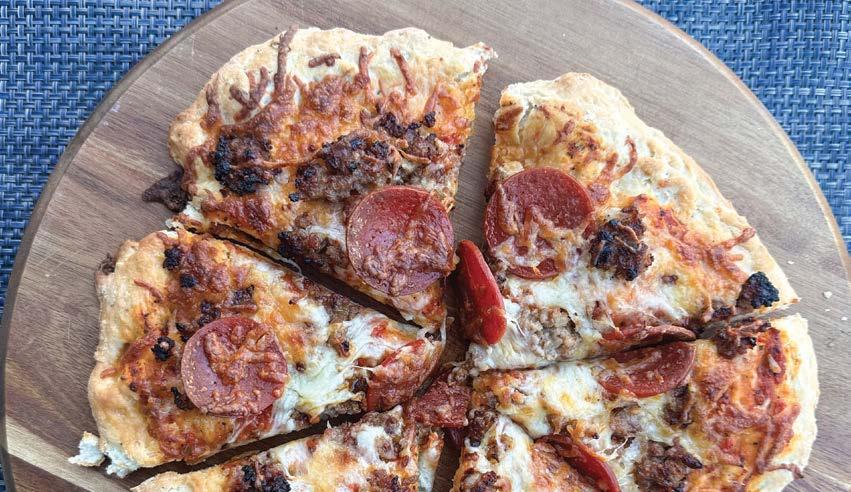



with Rebecca Turner



Pizza, arguably the quintessential comfort food, is relatively inexpensive, convenient to eat, and versatile, allowing for the personalization of toppings. The delicious combination of cheese, tomato sauce, and dough makes it appealing to people of all ages. And there is no need to order out; if you have an oven, griddle, or grill, you can make a killer pizza at home.
To make the best pizza at home, you need an extremely hot oven, a pizza stone or baking steel for the crispiest crust, and a good dough. Consider the moisture content of your toppings, and don’t overload the sauce or toppings.
The hotter, the better. Ideally, the best oven temperature for pizza is between 450 and 500 degrees, and a pizza stone, or baking pan should be placed on a lower oven rack.
You can make your own dough from scratch or use a pizza crust mix. You can also opt for a pre-made dough or crust. Pre-made crusts come in various thicknesses and sizes. Gently stretch the dough into a thin, even circle, avoiding excessive rolling with a rolling pin. Pre-bake the dough or pre-made crust for 4-5 minutes to allow it to crisp on the outside and prevent it from becoming soggy from the moisture of the sauce and toppings.
Use the pre-cooked dough and start on low heat to avoid burning the crust; lightly oil the griddle, poke holes in the dough with a fork to prevent bubbles, and use a dome lid to trap heat and melt cheese evenly. Cook toppings like vegetables on the griddle before adding them to the pizza.
To prevent a soggy pizza, choose toppings that are naturally drier or have been pre-cooked to release excess moisture. These include roasted vegetables like bell peppers, onions, and mushrooms, cooked meats like pepperoni, sausage, or chicken breast, and low-moisture cheeses like shredded mozzarella. Always pat dry raw, high-water-content vegetables like fresh tomatoes, spinach, or fruit.
Bake your pizza in the hot oven for 5-10 minutes or until a crispy crust.
Preheat the grill to high heat, lightly oil the grates, and then directly grill the dough for a short time on one side. Flip it, add toppings, and finish cooking over indirect heat until the crust is golden, and the cheese is melted.
2 cups all-purpose flour OR pizza flour (divided)
1 packet instant yeast
1 ½ teaspoons sugar
¾ teaspoon salt

¼ teaspoon garlic powder (optional)
¼ teaspoon dried basil leaves (optional)
2 tablespoons olive oil plus more
¾ - 1 cup warm water
Combine 1 cup of flour, instant yeast, sugar, salt, and optional seasonings in a large bowl.


Add olive oil and warm water and use a wooden spoon to stir very well.
Gradually add another 1 cup of flour. Stirring until the dough is forming into a cohesive, elastic ball and is beginning to pull away from the sides of the bowl. Add more flour or warm water in small amounts if needed to achieve a slightly sticky but still manageable dough.


Drizzle a separate, large, clean bowl generously with olive oil and use a pastry brush or small paper towel to brush up the sides of the bowl.
Lightly dust your hands with flour and form your dough into a round ball and transfer to an olive oil-brushed bowl. Roll the dough along the inside of the bowl until it is coasted in olive oil, then cover the bowl tightly with plastic wrap and place it in a warm place.


Allow dough to rise for 30 minutes or until doubled in size.
Once risen, use your hands to gently deflate it and transfer to a lightly floured surface and knead barely until smooth.
Work the dough with your hands or a rolling pin into a 10 to 12-inch circle.
Transfer dough to a greased pizza stone or pan.


Drizzle olive oil over the top of the crust and use the pastry brush or clean paper towel to brush the entire surface of the pizza dough.
Use a fork to poke holes all over the center of the pizza to keep the dough from bubbling.
Add crust to a preheated 425 or 450 degree oven for 3-5 minutes then remove.
Add desired toppings and bake for 10-15 minutes until the crust is golden brown and toppings melted.



14.5 ounces canned fire roasted tomatoes (undrained)
6 ounces canned tomato paste
1 tablespoon extra virgin olive oil
1 tablespoon minced garlic
2 teaspoons granulated sugar
2 teaspoons dried basil
1 teaspoon salt
1 teaspoon dried oregano
½ teaspoon pepper
½ teaspoon crushed red pepper flakes (optional)
Combine all ingredients in a food processor or blender.
Blend until mixture is smooth.
Store leftover sauce in an airtight container and last in the refrigerator for up to a week.

Classic duo: Pepperoni and Italian sausage
Classic trio: Pepperoni, ham, and mushrooms
Veggie delight: Bell peppers, onions, olives, and spinach
Italian sausage and onion: A classic savory combo
BBQ chicken pizza: Grilled chicken with BBQ sauce, red onion
Prosciutto and arugula: A light and fresh option
Bacon and caramelized onion: Sweet and salty combination

by Rebecca Turner
Rebecca Turner is an author, registered dietitian, radio host, television presenter, and board-certified in Lifestyle Medicine. She is A lifelong Mississippian and a member of the Central Electric Co-op in Brandon. Her books, “Mind Over Fork,” and “Enjoy Good Health,” offer no-nonsense nutrition guidance that challenges how you think, not how you eat. Find her on social media @RebeccaTurnerTalks or online at RebeccaTurnerNutrition.com.


Events open to the public will be published free of charge as space allows. Submit details at least two months prior to the event date. Submissions must include a phone number with area code for publication. Email to news@ecm.coop. Events are subject to change.
Mississippi Gem and Mineral Show. Feb. 22 and 23. Jackson. From 9 a.m. to 6 p.m. on Feb. 22. 9 a.m. to 4 p.m. on Feb. 23. Trade Mart on Mississippi State Fairgrounds. The event will feature 27 vendors, college and state organization exhibits and educational opportunities, children’s activities, and lapidary demonstrations. Admission for adults is $8 and $3 for students. Scouts/Leaders in uniform $2. Details: 601-278-3997 or missgems.org.
Mid-South Military History & Civil War Show. March 7 and 8. Southhaven. The South’s oldest military history show will be at the Landers Center in Southaven on I-55 and Church Road, Exit 287. Open March 7 from 1 p.m. to 6 p.m. and March 8 from 9 a.m. to 5 p.m. Admission is $10 each day for adults, two-day pass for $15, children 12 and under free. Vendors from across the country will have quality artifacts from the American Revolution through the 20th Century available to buy, sell, or trade. These include books, documents, prints, uniforms, weapons, relics, photographs, and Native American items. Musicians, food trucks, and re-enactors will be on site. On Saturday, historians will speak on the Civil War, World War 1, and World War II topics. Civil War re-enactors with a cannon and World War II re-enactors will be there as well. Details: 901-832-4708 or email dwharrison@aol.com.
Barnyard Marketplace Spring Festival. March 8. Poplarville. Come shop vendors in an open field. Off street parking. Crafts, food trucks, Easter items, woodwork, plants, jewelry, baked goods, boutiques, jams/jellies, honey, quail eggs, soaps, candles, and more. 9 a.m. to 3 p.m. 295 Buck Kirkland Rd. Details: 504-234-3579.
Good Ole Days Festival. March 8. Lucedale. Hosting the International Harvestor Tractor Club Chapter 44 State Show. All day events for a tractor show with new and antique tractors, hit and miss engines, and various farm equipment. Food, crafts, live demonstrations, live music, and entertainment for the kids. Will also be collecting family recipes to create a Good Ole Days Family Cookbook. Admission is free. LC Hatcher Elementary School Grounds, 689 Church Street. Details: 601-337-3136 or email goodoledaysfest@gmail.com.
Gerald Wolfe Hymn Sing Spring 2025 Tour. March 28. Hattiesburg. Proceeds go to the Gospel Music Hymn Sing Foundation. Gerald Wolfe, Greater Vision, The Whisnants, The Mark Trammel Quartet, The Mylon Hayes Family, Jim and Melissa Brady, and the Hymn Sing Band all perform. 7 p.m. at Heritage Church. 3 Baracuda Dr. Details: 601-261-3371.
Gulf Coast Military Relics, Antique Arms, and Collectible Show. May 23 and 24. Biloxi. Historical military artifacts and relics from all periods and all wars bought, sold, and traded. Firearms, swords, daggers, bayonets, uniforms, helmets, medals, insignia, flags, books, photos, currency, old bottles, and other collectibles will be available. May 23 – 11 a.m. to 5 p.m. May 24 – 9 a.m. to 4 p.m. Joppa Shriners’ Center, 13280 Shriner’s Blvd. Admission is $7. Parking is free. Details: 228-224-1120 and 228-860-3575.





























Is there anything new to say about Rodney, Mississippi? I’ve been doing stories on Rodney pretty much all my television career. I go back every so often to see what’s left of the place.
Over the holidays I saw some pictures posted on Facebook taken at Rodney recently. I was shocked to a degree because the place seems to have aged a good bit more since the last time I was there. But Rodney has done little but age over the decades, starting just after the Civil War when the Mississippi River deserted it by a mile or so, changing its course to the west. The railroad bypassed it in favor of a flatter, more inland route through Je erson County than the blu s along the river where Rodney sits. So, Rodney sat literally, as well as figuratively, high and dry (except for the occasional flooding of the Mississippi River), slowly leaking population to places with more prospects.
Even though it is almost forgotten and way o any main thoroughfare, there have been very few times I’ve been there when there weren’t others mulling about.
Long before my time, Rodney ceased being a viable town and started taking on the aspects of a ghost town. Fewer and fewer people had even heard of it. I found Eudora Welty photographs of the Presbyterian church and rambling cemetery on the hilltop behind it. She lamented how far Rodney had deteriorated even way back in her day. During that time there was still enough of a town to recognize it as being a town. I can think of very few places in Mississippi that are more out of the way than Rodney. It is somewhere south of Alcorn State University — west of Fayette, north of Natchez, and the closest other place to it that has a name is Lorman, south of Port Gibson. A handful of people still live there. The population swells several 100% during deer season with all the hunting camps in or near it.
Nowadays, about the only thing that brings people back to Rodney other than hunting is the church. It’s still an attraction for people who want to see a survivor from the past. That’s the odd thing about Rodney. Even though it is almost forgotten and way o any main thoroughfare, there have been very few times I’ve been there when there weren’t others mulling about. The last time I was there I met a fellow who had worked in West Point, moved to New Mexico, but was back in the state. One of the places he wanted to see was the Rodney church. He wasn’t disappointed.
Another fellow who grew up in Amite County, but now lived in Houston was there as well. He was visiting one of his “places to see before you die.”
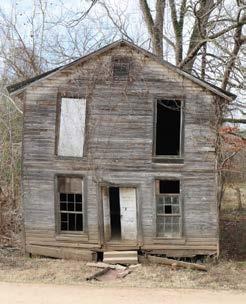
You’re never dead until you are forgotten. Although people have left Rodney in the dust for decades, it seems far from forgotten. It’s just getting older.

by Walt Grayson
Walt Grayson is the host of “Mississippi Roads” on Mississippi Public Broadcasting television and the author of two “Looking Around Mississippi” books and “Oh! That Reminds Me: More Mississippi Homegrown Stories.” Walt is also a reporter and 4 p.m. news anchor at WJTV in Jackson. He lives in Brandon and is a Central Electric member. Contact him at walt@waltgrayson.com.



















Download a free, interactive legislative app for Mississippi
Look for “ECM Legislative Roster” in the Apple App Store. An Android version is also available through the Google Play Store.





The Electric Cooperatives of Mississippi o ers an easy-to-use mobile app, which provides information on Mississippi’s state and federal elected o cials.







